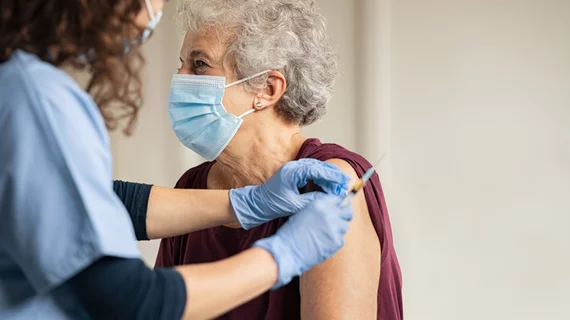New research compares COVID pneumonia in vaccinated vs unvaccinated patients
New research has found that, even when fully vaccinated individuals contract a breakthrough COVID infection, their pneumonia frequency and severity are reduced on imaging.
For the study, published June 1 in the American Journal of Roentgenology, investigators analyzed chest CT scans of 467 patients who had been hospitalized with symptomatic COVID-19. The team found around 80% of subjects who were fully vaccinated against the respiratory virus were able to dodge COVID pneumonia completely. That’s compared to 15% of unvaccinated patients.
Out of the 467 patients, 167 and 84 patients were fully vaccinated by the BNT162b2 mRNA vaccine or the ChAdOx1-S adenovirus vector vaccine. “Full” vaccination was defined as having had received the second dose at least 14 days before their COVID diagnosis. Each patient underwent chest CT and was given a CT severity score ranging from 0 to 25, with 0 indicating the absence of pneumonia.
Upon comparing vaccination status to CT severity scores, the researchers found absence of pneumonia as visualized on imaging was recorded at a rate of 29% (24/84) for patients who received a ChAdOx1-S vaccine and 51% (85/167) in patients fully vaccinated with BNT162b2.
In addition to reduced pneumonia frequency, researchers shared that fully vaccinated patients exhibited better CT severity scores than their unvaccinated peers. In the unvaccinated group, 86% (158/184) of patients with pneumonia showed bilateral lung involvement on CT.
“Pneumonia frequency and severity were lower in patients with full vaccination by mRNA and adenovirus vector vaccines experiencing breakthrough infections in comparison with unvaccinated patients,” corresponding author Davide Bellini from the Department of Radiological Sciences, Oncology, and Anatomical Pathology at "Sapienza" University of Rome, and co-authors wrote. “The visual observation by radiologic imaging of the protective effect of vaccination on lung injury in patients with breakthrough infections provides additional evidence supporting the clinical benefit of vaccination.”
Experts involved in the study suggest that their findings could add to the mounting surplus of evidence that supports COVID vaccination and could help to combat persisting vaccine hesitancy.
View the detailed research here.
Related COVID imaging news:
New imaging technique detects post-COVID lung abnormalities
Reactive lymphadenopathy slower to resolve after Moderna COVID vaccination
New cardiac MRI analysis offers updated insight into long-term impact of vaccine-related myocarditis
Lung abnormalities completely resolve for majority of COVID pneumonia patients
References: Pneumonia Frequency and Severity in Patients With Symptomatic COVID-19: Impact of mRNA and Adenovirus Vector Vaccines, Simone Vicini, Davide Bellini, Angelo Iannarelli, Marco Rengo, Giuseppe Pelle, Sergio Ruggiero, Michele Fusco, Cesare Ambrogi, and Iacopo Carbone

